School for Scoundrels
 for language, crude and sexual content, and some violence.
for language, crude and sexual content, and some violence.
Reviewed by: Robert A. Kouba
CONTRIBUTOR
| Moral Rating: | Offensive |
| Moviemaking Quality: |
|
| Primary Audience: | Teens Adults |
| Genre: | Comedy Remake |
| Length: | 1 hr. 41 min. |
| Year of Release: | 2006 |
| USA Release: |
September 29, 2006 (wide) |
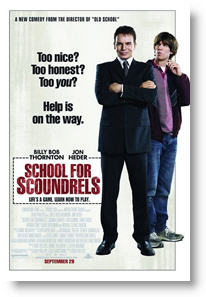
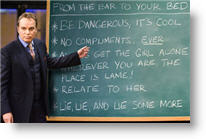
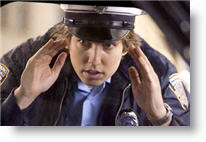
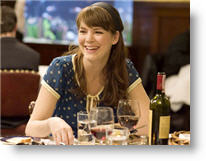
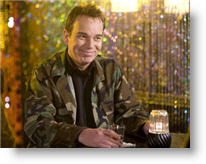
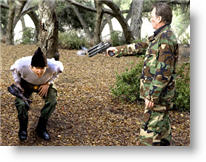
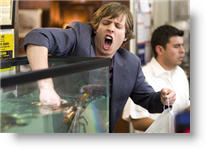


What are the biblical guidelines for dating relationships? Answer
What is true love and how do you know when you have found it? Answer

Learn how to make your love the best it can be. Christian answers to questions about sex, marriage, sexual addictions, and more. Valuable resources for Christian couples, singles and pastors.

Teens! Have questions? Find answers in our popular TeenQs section. Get answers to your questions about life, dating and much more.
| Featuring |
|---|
| Billy Bob Thornton, Jon Heder, Jacinda Barrett, Michael Clarke Duncan, Dan Fogler |
| Director |
| Todd Phillips (“Old School”) |
| Producer |
| Harvey Weinstein, Bob Weinstein, Hal E. Chester |
| Distributor |
“Life’s a game. Learn how to play.”
Ever had one just of “those days?” It seems that Roger (played by “Napoleon Dynamite”’s Jon Heder) has had one of those lives, judging by the amount of self-help literature by his bedside. Donning his meter maid outfit, Roger continues along in a seemingly thankless existence, while others constantly use him as an object of ridicule. He finally breaks down after being “fired” as a Big Brother for the third time. All is not lost, however, since the leader of the Big Brother organization used to be just like him. Hope lies just a phone call away… well, a phone call and __,000 in a manila envelope.
Enter the world of the “School for Scoundrels” (actually the class has no name) led by smarmy Dr. P (portrayed with vicious charm by Billy Bob Thornton). With the help of a Goliath-like assistant Lesher (Michael Clarke Duncan), Dr. P will crush any self-confidence you have and replace it with the attributes needed to become a lion in the world’s jungle. As one might expect, the exercises in the class put the students in awkward situations which are then supposed to illicit laughter at their misfortunes. However, Roger is able to rise above these small setbacks and rise to the occasion. He gets an attitude and stands up to past bullies, which is funny, since he can never physically back up his trash talk. He is also able to start pursuing an unrequited love interest— his neighbor Amanda. One might say that he is becoming the star of the class.
It seems that his troubles are just beginning, since Dr. P likes to strike down any star pupils. His favorite method? Stealing their newly acquired girls for himself. What ensues is a teeter-totter of pranks to force the other man to back down. However, it seems that while Roger’s actions are good enough to teach someone a lesson, Dr. P can always dig deep enough to pull out something really dastardly. So what can Roger do to turn the tide? He recruits a former rising star of Dr. P’s (Ben Stiller) along with some other classmates, including SNL alum Horatio Sanz, in order to make one final stand for the woman he loves.
The movie itself is much of what you would expect. Humor is sporadic and usually the result of slapstick-type situations. The film is written/directed by Todd Phillips who is responsible for films such as “Road Trip,” “Starsky and Hutch,” and “Old School.” Therefore, it is not surprising that the film skirts the line on occasion in its appropriateness. Along with crude humor and language, you will also hear about 35 expletives including one f-word and ten uses of the Lord’s name in vain. I was also appalled at the brief insinuations that Lesher is a male rapist.
On a higher level, films of this nature tend to refute the wrong teachings instilled by the teacher. However, it is never brought about as being wrong or frowned upon. Credos such as “lie, lie, and lie some more” are introduced and never fully resolved. Perhaps this is how we are meant to see that success must be achieved. I myself am wondering how the 1960 film “School for Scoundrels or How to Win Without Actually Cheating!” handled the subjects. Since most of the lessons learned fly in the face of spiritual truth, and there is no real mention of God except for the aforementioned expletives, I also think it is safe to say that the movie lacks any moral edification.
In the end, because of general inappropriateness and a misguided message, I would recommend a matinee or rental only—and even that is a little generous. While I want to like Heder’s character Roger, I wonder what kind of man he turns out to be. His closing remark is “those that can do, and those that can’t teach.” If Thornton’s Dr. P is the teacher, what does that make Roger? A nice guy rejecting this worldly point of view or the student who has superceded the master?
Violence: Mild / Profanity: Moderate / Sex/Nudity: Minor
See list of Relevant Issues—questions-and-answers.


Offensive / 4
Very Offensive / 3

My Ratings: Average / 3